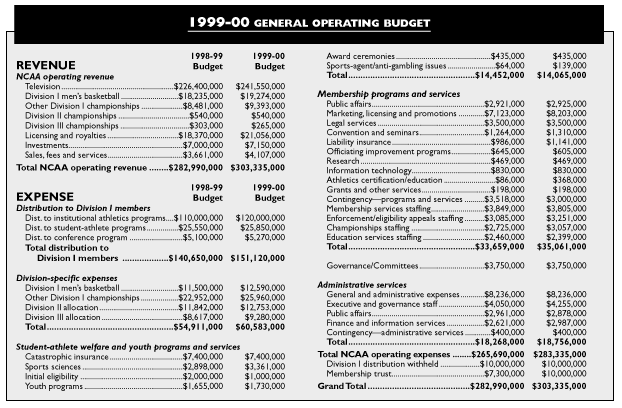The NCAA News - News and Features
The NCAA News -- August 30, 1999
Increasing distributions to resume with 1999-00 budget
BY GARY T. BROWN
STAFF WRITER
After a one-year interruption in increased revenue distributions, Division I members will see a return to escalated disbursements in the coming year.
The NCAA Executive Committee recently approved an operating budget of $303.3 million for fiscal year 1999-00, which represents an increase in revenue of 7.2 percent ($20.3 million), achieved primarily from scheduled increases in television rights fees.
The committee approved the budget during its August 6 meeting in Indianapolis.
More than $16 million of the new revenue will be distributed to the membership and conferences to support local programs and student-athlete welfare initiatives and to conduct championships in all three divisions.
Expenditures for 1999-00 also are budgeted for a 7.2 percent increase. Most of the increased expenses are from either direct payments distributed to Division I institutions or for guaranteed allocations in Divisions II and III that are used to fund services in those divisions.
Division I allocations (distribution, championships expenses, travel expenses, etc.) increased approximately 9 percent, while Divisions II and III allocations increased by approximately 7.7 percent. Association-wide expenses (including the NCAA national office) increased by 2.4 percent.
Expenses in the 1999-00 budget were reduced when the Executive Committee voted to approve a resolution to borrow $15 million through tax-exempt financing available to nonprofit organizations. Because this form of financing is available only for capital purposes, the committee voted to borrow for planned expenditures incurred in moving the NCAA national office to Indianapolis.
The recommendation to issue tax-exempt bonds originated from the Executive Committee's Budget Subcommittee.
The Association already has paid for some of the relocation expenses, including nearly $7 million in staff-transition expenses, but the Executive Committee chose to borrow funds to help pay for other relocation initiatives such as the NCAA distribution center, a conference center located in the new headquarters building, and technological improvements and furnishings, all of which are considered capital improvements that can be funded through tax-exempt financing.
The Executive Committee approved the resolution after a review of several financial options.
The committee determined that tax-exempt financing was less expensive than paying cash or having to use other financial arrangements that would cost the Association.
Many of the relocation expenses were products of the Association's decision to enhance the membership's use of the national office.
The new headquarters facility is one that will accommodate more NCAA committee meetings as well as provide a technology infrastructure to ensure the national office could utilize technology in the dissemination of information to its members.
In addition, the office was structured to foster a more open environment with maximum flexibility, which made the transfer of existing furniture from the former office impractical.
The Association also elected to construct a distribution center in Indianapolis to replace the outdated storage warehouse the NCAA maintained in Overland Park, Kansas.
As part of the incentive package to relocate, the city of Indianapolis provided the land at no cost for the Association to construct the distribution center, which will provide storage for Hoop City build-outs, library holdings, and Association supplies and materials. The facility also will serve as a distribution and service center for the national office and Hall of Champions.
The Executive Committee determined that it was less expensive to buy the facility through tax-exempt financing than renting the space or entering a lease-back arrangement with a developer.
Another additional expense was the construction of a conference center in the national office complex that could accommodate large groups, including the Management Councils and presidential bodies from all three divisions.
The Executive Committee felt that not only was it financially prudent to use tax-exempt financing to fund the additional construction costs, but savings from holding committee meetings at the national office are estimated to be as much as $500,000 annually.
Those savings would nearly cover the debt service costs of $550,000 amortized over 20 years.
The $15 million loan agreement, arranged through the Indiana Finance and Development Authority, will cover the cost of purchasing the distribution center, technology and furnishings for the headquarters building and the addition of a conference center and tenant improvements.
Other action
In another decision reached during the Executive Committee's August 6 meeting, the committee agreed to support efforts to initiate federal legislation that would ban all collegiate sports wagering.
The legislation would be aimed at the three states (Nevada, Oregon, and Delaware) currently exempted from federal law making sports gambling illegal in most states.
The action follows on the heels of a report from the federally appointed National Gambling Impact Study Commission that included a recommendation for such legislation.

|